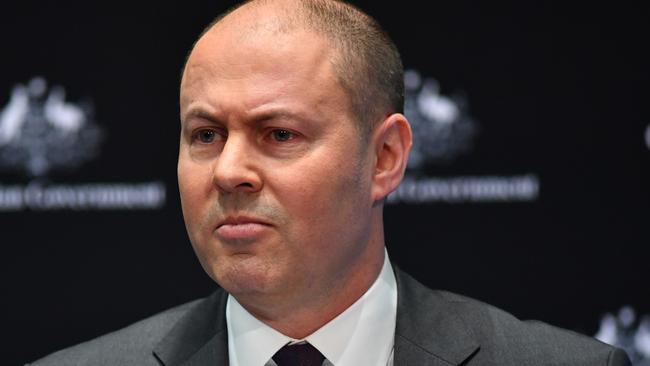Terry McCrann: Economic lockdown made huge deficits inevitable
They are the “good” deficits we had to have, and if we can get the economy — and our lives generally — back to some sort of normality, they’ll be much smaller in the years to come, writes Terry McCrann.
Terry McCrann
Don't miss out on the headlines from Terry McCrann. Followed categories will be added to My News.
These are the deficits we had to have.
Treasurer and Treasury say they will be $86 billion in the fiscal year that’s just ended and $185 billion in the fiscal year that’s just started.
The $86 billion will be pretty right — for goodness sake, it’s estimating numbers for a year that’s already finished.
The $185 billion is like a dart thrown at a dartboard by someone wearing a blindfold after being twirled around a few times.
To capture that, perhaps Treasury can tell us, for example, how many Victorians will be tested and shown to have the virus on — just pick a date — next January 27?
At least Treasury hasn’t even tried to pretend to even broadly estimate what the deficits will be in the years after this one. And they will be deficits — every year at least all the way through the 2020s.
If we can get the economy — and our lives generally — back to some sort of normality, they’ll be much smaller. That all depends on the virus and whether we get a vaccine.
The first thing about the deficits is that they were unavoidable once the government decided in March to fight the virus by locking down the economy, throwing hundreds of thousands out of work and damaging and destroying tens of thousands of businesses.

That meant tax revenues would plummet and spending would rocket. With the budget barely in balance before this, it made deficits of some size inevitable.
But then the government made them bigger with the new spending — the biggest areas the JobKeeper payments to 3.5 million workers and the doubling of JobSeeker (the dole).
It had to make those payments. It also made sense to make them; it kept the economy from falling into an even deeper hole.
So the second big thing about these deficits is that they are “good’ deficits.
As the Treasurer emphasised, correctly, they won’t be a great burden on taxpayers because interest rates are so low. The extra $270 billion can be borrowed at just 1 per cent – costing just $3 billion or so a year in extra interest.
But, and they are two big and crucial buts. That’s the cost right now. If interest rates go up, so will the cost. Secondly, if we have more big deficits, the cost on taxpayers will further rise.
They are problems for tomorrow. Right now, we have to get through the virus and get the economy picking up sustainably; getting business going and putting people back in jobs.
And that journey starts right here in Victoria with the current disaster and lockdown that have thrown one-quarter of the national economy back into recession.
If it goes longer than six weeks, and I cannot see how that can’t happen, the whole country has a problem.
Prime Minister Scott Morrison would never has said a truer word than when he said: “we are all Victorians now”.
READ MORE
